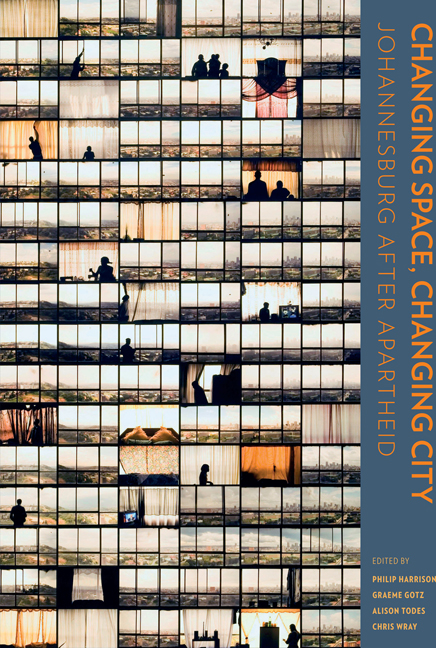Book contents
- Frontmatter
- Contents
- Preface
- Cartography
- 1 Materialities, subjectivities and spatial transformation in Johannesburg
- Section A The macro trends
- Section B Area-based transformations
- Section C Spatial identities
- 23 Footprints of Islam in Johannesburg
- 24 Being an immigrant and facing uncertainty in Johannesburg: The case of Somalis
- 25 On ‘spaces of hope’: Exploring Hillbrow's discursive credoscapes
- 26 The Central Methodist Church
- 27 The Ethiopian Quarter
- 28 Urban collage: Yeoville
- 29 Phantoms of the past, spectres of the present: Chinese space in Johannesburg
- 30 The notice
- 31 Inner-city street traders: Legality and spatial practice
- 32 Waste pickers/informal recyclers
- 33 The fear of others: Responses to crime and urban transformation in Johannesburg
- 34 Black urban, black research: Why understanding space and identity in South Africa still matters
- Contributors
- Photographic credits
- Acronyms
- List of plates
- List of figures
- List of tables
- Index
29 - Phantoms of the past, spectres of the present: Chinese space in Johannesburg
from Section C - Spatial identities
Published online by Cambridge University Press: 20 April 2018
- Frontmatter
- Contents
- Preface
- Cartography
- 1 Materialities, subjectivities and spatial transformation in Johannesburg
- Section A The macro trends
- Section B Area-based transformations
- Section C Spatial identities
- 23 Footprints of Islam in Johannesburg
- 24 Being an immigrant and facing uncertainty in Johannesburg: The case of Somalis
- 25 On ‘spaces of hope’: Exploring Hillbrow's discursive credoscapes
- 26 The Central Methodist Church
- 27 The Ethiopian Quarter
- 28 Urban collage: Yeoville
- 29 Phantoms of the past, spectres of the present: Chinese space in Johannesburg
- 30 The notice
- 31 Inner-city street traders: Legality and spatial practice
- 32 Waste pickers/informal recyclers
- 33 The fear of others: Responses to crime and urban transformation in Johannesburg
- 34 Black urban, black research: Why understanding space and identity in South Africa still matters
- Contributors
- Photographic credits
- Acronyms
- List of plates
- List of figures
- List of tables
- Index
Summary
Respect ghosts and gods but keep them at a distance.
– The Analects of Confucius, 6.20Phantoms lie about the past whilst spectres gesture towards a still unformulated future.
– Colin Davis, 2005Spectrality does not involve the conviction that ghosts exist or that the past (and maybe even the future they offer to prophesy) is still very much alive and at work, within the living present: all it says, if it can be thought to speak, is that the living present is scarcely as self-sufficient as it claims to be; that we would do well not to count on its density and solidity, which might under exceptional circumstances betray us.
– Frederic Jameson, 1999Phantom spaces
In the seventh lunar month of the Chinese calendar the gates of hell are opened and ghosts are released to roam the world. Those who died a wrongful death – Diao Sǐ Guǐ – or those who passed away far from home – Gū Hún Yě Guǐ – are oft en restless and vengeful, seeking recompense. It is a dangerous month to be out and about in Johannesburg for nearly 3 200 Chinese mine workers died on the Witwatersrand in the short period between 1904 and 1910. Faced with primitive conditions in the mines and prison-like conditions in the compounds in which they were housed, the lives of mine workers were ended by ‘execution, disease, opium overdoses, accidents, homicide and suicide’ (MacLellan 2008: 78). The dying suffered the terrible loneliness of being 7 000 miles away from home.
Around 63 000 Chinese were brought from the northern provinces of Henan and Shandong after the South African War to work on the gold mines as indentured labour. It was a move that restored production to the mines that had been closed during the war but provoked near hysteria among Johannesburg's white citizens and helped bring down Lord Arthur Balfour's government in the United Kingdom. By 1910 all the surviving Chinese workers had been repatriated except for the handful that had absconded and avoided capture (Kynoch 2005).
- Type
- Chapter
- Information
- Changing Space, Changing CityJohannesburg after apartheid, pp. 512 - 526Publisher: Wits University PressPrint publication year: 2014



